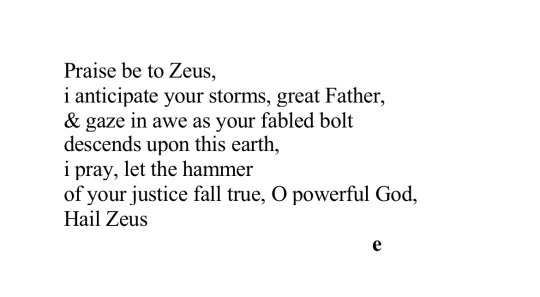Text

baby hermes gifts the tortiseshell lyre to apollo
(inspired by this comic by the fantastic @medusaspeach)
503 notes
·
View notes
Text
Guide to Offering
I made a little pamphlet for those who want an outline to start making your own offerings to the theoi. I hope it helps you all!

129 notes
·
View notes
Text
Casual ways to connect with your deities
-Pray to them or just just talk with them and tell them about your day
-Light a candle and say your thanks
-Offer your meal/snack to them or bake/cook with them or for them
-Watch a movie in their honor
-Offer your morning drink to them or make a cup for them
-Assign them a plant and take care of it as a devotion to them
-Listen to music that reminds you of them
-Say good morning/good night
-Thank them for the things you see that you consider beautiful

5K notes
·
View notes
Text
Hermes, herald of Zeus, lord of roads
Protect those beloved who travel afar
May them come home, safe from harm
Be it by land, heavens or sea
May you be by their side, Hermes of the winged feet
410 notes
·
View notes
Text
Poem to Hermes
Great Messenger and guide
Be with me as I travel these roads
I feel you flying with me these days
On the less traveled gravel roads
But you are also on the paved interstates
Guiding people back home safely
You are found everywhere there is travel
Watching over the world as we come and go
I see you with the refugees of the world
Guiding them to their new home
Fierce anger when they are turned away
Righteous fury for them as they are neglected
Be with them in this trying time
And guide our hearts on how to help them.
175 notes
·
View notes
Text
gay rights more like gay rites i say as i put on a dionysian ritual and party with a bunch of bacchants
2K notes
·
View notes
Text
It's been a while since I've been on Tumblr mobile and... wow.... it's........ terrible
0 notes
Text
My semester is almost done 😪 I've been so burnt out on everything I haven't even had the spoons to do offerings. But once my semester ends I'm definitely gonna reconnect with the gods. Just two more weeks!!
1 note
·
View note
Photo

The blood moon is framed by the statues of Hera and Apollo in Athens, 27 July 2018 (x)
246K notes
·
View notes
Text
fooor the love of bougatsa please respect the language of the most ancient hymns of the Greek gods you worship and really take in that the word "Hellenic" is actually the Greek word for "Greek". Realize that Greeks use it and have been using it generations ago, and that you are probably - unintentionally - misusing it today.
You don't say "I am a Norse" if you are a "Norse pagan", or a "Norse polytheist". You don't say "my religion is Slavism" when you are taking the worship of ancient Slavic gods. So please make sure you are using the Greek word correctly and don't say that you are just "a Hellenic"? Ok so what, why am I talking about grammar all of a sudden?
The main reason I'm emphasizing this is: do you know what the "Hellenic community"/"Hellenism"/"Hellenismos" is literally used for? The Greek people. The Greek community. The Greek culture. That's how Greeks self-identify and characterize their culture consistently since the creation of our state, the Hellenic Republic.
I am not saying don't use the word "Hellenic". I am saying use it appropriately! But please don't use "Hellenismos"/"Hellenism" as a substitute for "Hellenic polytheism".
The ancient religion with the name "Hellenismos" is not the same as a generic worship of some Greek gods today. It referred to a specific ancient belief system that I haven't seen one Hellenic polytheist online use. (Maybe they exist but they are very rare)
It baffles and upsets many Greeks when they learn about how foreign polytheists are using the terms. The younger ones have a milder averse reaction but if I say it to my Greek aunt or parents? Ooof... It's going to blow their mind and not in a good way. Because for them/us the fact that's they miss you are very important words for "Greek" and "Greekness" while loving the ancient Greek culture and religion shows disrespect. It's disrespectful to the people who are on average the most exposed to the myths and Hellenic antiquity since birth, and safekeep the heritage and cultural riches of our country.
I know that "Hellenismos" has been used wrong for some years now but can the foreign community slowly unlearn it? It's not a traditional Anglophone name, or so blended with the English language that such use is normalized in Anglophone societies. Its modern use is very recent and it started by misinformed individuals (who may or may not had viewed Greek culture in a fetishizing way) back when things were not very culturally sensitive, and we were viewed by the international community as not being capable enough to care for our Parthenon marbles.
If many Greek scholars hadn't left for Central Europe after the fall of Constantinople, you wouldn't have so much material or interest about our antiquity today. We were never cut from the myths and the gods, even if it's not our ethnic religion, and we safekept many things in the face of danger (no exaggeration here). Apparently I need to state the obvious fact that the Greek people of all eras were an organic part of the process that lead you to learn about these gods.
Please respect our traditional identification terms as a nation. It's not much to ask.
* I already have some posts on this matter and I can link them for you if you ask, but that's the gist of it. As you understand I'm not going to hunt down anyone with a pitchfork. I am just taking the issue out there one more time.
1K notes
·
View notes
Text
I haven't talked about this here before, but a big part of my year was spent working on my two pieces for this zine! I'm so excited to share my work with you 💚💛

The Let Them Lay Together: Patrochilles Zine is a non-profit, English language physical and digital fanzine to commemorate the Greek heroes: Achilles and Patroclus. A bonus, kink-friendly digital add-on will also be available!
This zine includes various versions of Achilles and Patroclus throughout history and media, written and drawn by more than 30 incredibly talented contributors, as well as interviews with Ben Prendergast, Patroclus' VA in Hades, and Barry Purves, the creator of the iconic stop motion short film Achilles (1995)!
All proceeds made will be donated to People In Need (PIN), specifically for Ukrainian Humanitarian Aid.
Preorders will be open from July 25 to August 26!
251 notes
·
View notes
Text
More Basic Basics of Ancient Greek: How to pray the ancient way
So you’re a Hellenic polytheist, and you’ve decided to add a touch of history to your prayers: you want to say them, or part of them, in Ancient Greek. While this is by no means a requirement - the Gods will surely understand you no matter which language you speak - Ancient Greek in prayer and ritual can function like a liturgical language, and can make you feel closer to those who first practised this religion. But where to start? Which words to use? This post is here to help.
The following words and phrases are all drawn from ancient texts, ranging from the 8th century BC to the 4th century AD. (If you’re curious about where a certain phrase appears, you’re welcome to send me an ask.) Pick the ones that resonate most with you, try them out, and have fun!
Pro tip: before we start, I recommend that you get familiar with the alphabet and standard pronunciation, and for more versatility, check out the basics of Greek grammar and how the case system works.
However, if it’s all too much for you, skip to the end where I’ll offer a few templates ready for you to use!
Greetings and invocations
The most common Ancient Greek greeting, which you might’ve encountered before, is χαῖρε. When addressing several people or Gods, it’s χαίρετε. It literally means “rejoice!” and has a similar usage to “hail”, “salve/salvete” or simply “hi”.
In the Iliad 23.179, Achilles greets Patroclus’ dead soul with the phrase χαῖρέ μοι, ὦ Πάτροκλε, καὶ εἰν Ἀίδαο δόμοισι: I greet you (litt. “rejoice for me”), Patroclus, even in the home of Hades.
However, in prayers and hymns, χαῖρε/χαίρετε is less common as a greeting than as a farewell. A more common formula is κλυθί μοι: this means “listen to me”. When addressing several deities, use the plural form κλῦτε μοι.
The next thing you will need is the name of the deity or deities, in the vocative. This is the most important part: many prayers skip χαῖρε and κλυθί μοι and start directly with the deity. As in the quote above, the name can be preceded by ὦ, which is the equivalent of English “O”.
Here are the names of major Hellenic deities (nominative) with their forms in the vocative:
Ζεύς (Zeus): Ζεῦ
Ἥρα/Ἥρη (Hera): same as nominative
Ποσειδών (Poseidon): Πόσειδον
Δημήτηρ (Demeter): Δήμητερ
Ἀΐδης (Hades): Ἀΐδη
Ἑστία/Ἑστίη (Hestia): same as nominative
Ἀθηνᾶ/Ἀθήνη (Athena): same as nominative
Ἑρμῆς (Hermes): Ἑρμῆ
Ἄρτεμις (Artemis): Ἄρτεμι
Ἀπόλλων (Apollon): Ἄπολλον
Ἥφαιστος (Hephaistos): Ἥφαιστε
Διόνυσος (Dionysos): Διόνυσε
Ἄρης (Ares): Ἄρες
Περσεφόνη (Persephone): same as nominative
Bonus: in both nominative and vocative, God is θεός, Goddess is θεά, Gods is θεοί, and Goddesses is θεαί.
To invoke two or more deities, use και, τε και or τε… τε, which all mean “and”, e.g.: Ἄρτεμι καὶ Ἄπολλον, Ζεῦ τε καὶ Ἥρη, Δημήτηρ τε Περσεφόνη τε.
Another option is καλέω, “I call”, or κικλῄσκω, “I summon”. If you choose one of these, you will need the name of the deity and their epithets in the accusative, not in the vocative as above. (If you have trouble figuring out a certain deity’s name, let me know.)
Epithets
After calling upon the deity, you will need to qualify them using one or more epithets. These will need to be in the same case as the deity’s name (vocative or accusative, depending on the formula you chose). The Theoi Project provides lists of epithets for each deity which you may want to look through. Make sure to choose aspects and areas appropriate to your request, as in the following examples:
ἀλλ᾽ ἄγ᾽ Ἐλευσῖνος θυοέσσης δῆμον ἔχουσα / καὶ Πάρον ἀμφιρύτην Ἀντρῶνά τε πετρήεντα, / πότνια, ἀγλαόδωρ᾽, ὡρηφόρε, Δηοῖ ἄνασσα: but now, you who hold the people of sweet-smelling Eleusis, and Paros encircled by sea and rocky Antron, lady, giver of beautiful gifts, bringer of seasons, queen Deo (Homeric Hymn to Demeter 490-492)
The Homeric Hymn to Demeter is concerned with Demeter in her seasonal, fertility aspects, as well as how she came to be worshipped in Eleusis. The epithets chosen by the author in the above quote reflect this.
ὦ πότνια, πότνια, θύμασιν βροτησίοις / χαρεῖσα: o lady, lady, rejoicing in human sacrifice (Euripides Iphigenia in Aulis 1524-1525)
This line is spoken just before Iphigenia is sacrificed to Artemis, so it makes sense to describe the Goddess as appreciating this kind of ritual.
Ζεῦ ἄνα, Δωδωναῖε, Πελασγικέ, τηλόθι ναίων, / Δωδώνης μεδέων δυσχειμέρου: lord Zeus, Dodonian, Pelasgian, who lives afar, ruler of harsh-weathered Dodona (Iliad 16.233-234)
Here, Achilles is calling on a particularly archaic and venerable aspect of Zeus in the hopes that Patroclus will be kept safe. Dodona, the oldest known oracle of Zeus, and the Pelasgians, pre-Greek peoples, underline this ancient power.
Past worship
If making a request, you may want to mention past offerings and devotions you have made for the deity. This usually takes the form “if ever I…”, as in the Iliad 503-504: εἰ ποτε δή σε μετ’ ἀθανάτοισιν ὄνησα / ἢ ἔπει ἢ ἔργῳ: if ever I, among the immortals, pleased you in words or in actions…
In simpler words: εἰ ποτε σε (sg)/ὑμᾶς (pl) ὄνησα ἢ ἔπει ἢ ἔργῳ, “if ever I pleased you (sg/pl) in words or in actions”.
After this, you can move straight on to your prayer, or you can specify: μοι κρῆνον (sg)/κρῆνατε (pl) ἐέλδωρ, “fulfill (sg/pl) my wish”, or λιτὰς ἐμῶν δέξο/δέξασθε, “receive my prayers”.
Supplications and thanksgiving
Then, finally, you get to the actual prayer. This can take two forms: supplication (please grant me a thing) or thanksgiving (thank you for granting me a thing).
In a supplication, you can either use a verb in the imperative (grant me a thing) or in the optative (may you grant me a thing). Though giving orders to a deity may seem strange, neither is more polite or appropriate than the other - you can choose whichever you prefer. Here are a few verbs you might find useful:
φέρε/φέρετε (imperative sg/pl), φέροις/φέροιτε (optative sg/pl): to bring (+ accusative)
πέμπε/πέμπετε, πέμποις/πέμποιτε: to send (+ acc.)
δίδου/δίδοτε, διδοῖς/διδοῖτε: to give (+ acc.)
ἰάτρευε/ἰατρεύετε, ἰατρεύοις/ἰατρεύοιτε: to heal (+ acc.)
ἐπιμελέου/ἐπιμελέσθε ὑπέρ, ἐπιμελέοιο/ἐπιμελέοισθε ὑπέρ: to take care of X (+ genitive)
Some things you can pray for:
ἐγω (nom.), με/ἐμε (acc.), μου/ἐμου (gen.): I, me
for “my X”, use “X μου”
μήτηρ (nom.), μητέρα (acc.), μητρός (gen.): mother
πατήρ, πατέρα, πατρός: father
ἀδελφός, ἀδελφόν, ἀδελφοῦ: brother
ἀδελφή, ήν, ῆς: sister
φίλος, ον, ου (male) φίλη, ην, ης (female): friend
οἶκος, ον, ου: home
ἀλκή, ήν, ῆς or βία, αν, ας: strength
θάρρος, ος, ους: emotional strength, courage
ἀγαθή τύχη, ἀγαθήν τύχην, ἀγαθῆς τύχης: good luck
ὑγίεια, αν, ας: health
εἰρήνη, ην, ης: peace
σωτηρία, αν, ας: safety, preservation
In a fragment of a poem by Simonides (PMG 543), Danae prays that her troubles reach an end, saying εὑδέτω δ’ ἄμετρον κακόν: may this endless sorrow sleep. Εὑδέτω κακόν or variants like εὑδέτω φόβον (”may fear/panic sleep”), εὑδέτω νόσον (”may illness sleep”) or εὑδέτω ἔριν (”may quarrel sleep”) could be a nice image to include.
When it comes to thanksgiving, a common phrase is ἐμοῦ ἔκλυες/ἐκλύετε εὐξαμένου, “you listened to me when I prayed”. You can follow it with (καὶ) νῦν χάριν φέρω σοι/ὑμῖν, “(and) now I bring you thanks”. Εὐχαριστῶ σοι/ὑμῖν, “I am thankful to you”, is an alternative which is still widespread in modern Greece, though in ancient times, it was mostly used within Christianity.
Farewells
Once you have spoken your prayers, it is time to take your leave of the deity. This is most commonly done using χαῖρε/χαίρετε, as mentioned above. If you wish, you can name the deity again along with a couple of epithets. Telling them you will remember them in future prayers is a nice touch; the Homeric Hymns use αὐτὰρ ἐγὼ καὶ σεῖο καὶ ἄλλης μνήσομ᾽ ἀοιδῆς: but I will remember you, and another song. A simpler, adapted version would be σοῦ/ὑμῶν μνήσομαι καὶ ἄλλης εὐχῆς, “I will remember you, and another prayer”. Another possibility could be σοῦ/ὑμῶν μνήσομαι ἔπει καὶ ἔργῳ, “I will remember you in words and in actions”.
In summary
χαῖρε/χαίρετε: hail
κλυθί μοι/κλῦτε μοι: listen to me
καλέω or κικλῄσκω: I call, I summon
εἰ ποτε σε/ὑμᾶς ὄνησα ἢ ἔπει ἢ ἔργῳ: if ever I pleased you in words or in actions
μοι κρῆνον/κρῆνατε ἐέλδωρ: fulfill my wish
λιτὰς ἐμῶν δέξο/δέξασθε: receive my prayers
εὑδέτω X: may X sleep
ἐμοῦ ἔκλυες/ἐκλύετε εὐξαμένου: you listened to me when I prayed
νῦν χάριν φέρω σοι/ὑμῖν: now I bring you thanks
εὐχαριστῶ σοι/ὑμῖν: I am thankful to you
σοῦ/ὑμῶν μνήσομαι καὶ ἄλλης εὐχῆς: I will remember you, and another prayer
σοῦ/ὑμῶν μνήσομαι ἔπει καὶ ἔργῳ: I will remember you in words and in actions
Prayer examples
With all this, you can now create your own short prayers in Ancient Greek! Below I have written out a few templates you can work with. If you have any questions, or if you need help figuring out a certain phrase, I’m happy to help!
A thanksgiving prayer to Zeus:
Ὦ Ζεῦ, ὕπατε, πάτερ ἀνδρῶν τε θεῶν τε, ἐμοῦ ἔκλυες εὐξαμένου καὶ νῦν χάριν φέρω σοι. Χαῖρε, Ζεῦ ἄνα, καὶ σοῦ μνήσομαι ἔπει καὶ ἔργῳ.
O Zeus, most high, father of men and Gods, you listened to me as I prayed and now I bring you thanks. Hail, lord Zeus, and I will remember you in words and in actions.
A prayer to Artemis for anxiety relief:
Κλυθί μοι, Ἄρτεμι σώτειρα, ἡμερασία, λυσιμέριμνε, καὶ εἰ ποτε σ’ ὄνησα ἢ ἔπει ἢ ἔργῳ, μοι κρῆνον ἐέλδωρ˙ δεῖμα μου πέμποις εἰς ὀρέων κεφάλας, καὶ φέροις εἰρήνην. Χαῖρε, φίλη θεά.
Listen to me, Artemis saviour, of a gentle nature, deliverer of troubles, and if ever I pleased you in words or actions, fulfill my wish: may you send my fear away to the summits of the mountains, and bring down peace. Hail, dear Goddess.
A prayer to Apollon and Asclepios for a sick friend:
Καλέω Ἀπόλλωνα ἰατρόν καὶ Ἀσκληπιόν ἤπιον, φιλολάους˙ ἰατρεύετε φίλον ἐμου καὶ δίδοτε αὐτῷ ὑγίειαν, τε καὶ εὑδέτω νόσον.
I call upon Apollon the healer and kind Asclepios, lovers of the people: heal my friend and give him good health, and may illness sleep.
3K notes
·
View notes
Text
Hellenic Polytheism 101
A collection of posts others have written to start or further your worship, and additional resources.
Pronouncing Greek Gods’ Names
Greek Sign Language - Signing Greek Gods’ Names
On Household Worship
Household Gods
Things Every Baby Hellenic Should Know (also here)
Home Study for Greek and Roman Polytheism
How to Pray in Ancient Greek
Suggestions for Ending Prayers
Basic Greek Phrases for Rituals
Miasma vs Lyma (also here and here)
Khernips
Formal Ritual (Ouranic)
Tips for Khthonic Rituals
Theogony
Nymph Worship
Hero Worship
Underworld
Death Rites Resources
Wedding Rites
Veiling
Historical Offerings
Make An Offering
Festival/Holy Day Descriptions
Hekate’s Deipnon
Noumenia
Devotional Journal/Heirographe, also here and here
Mythology vs Cultus
Divination
Astragaloi
Homeric Oracle Online
Homeric Oracle
Greek Alphabet Oracle (and a second link)
Apollo’s Oracle Online
Golden Thread Tarot App
Sortes Vergilianae Online
Ornithomancy
Festivals
Attic Calendar Converter
Numachi
Baring the Aegis Attic Calendar Explanation
Sponde!
Hellenion Festival Descriptions
Temenos
Ethics, Philosophy etc.
Delphic Maxims
Solon’s Tenets
Golden Verses of Pythagoras
PDFs
Theogony & Works And Days; Hesiod
Myths
1K notes
·
View notes





